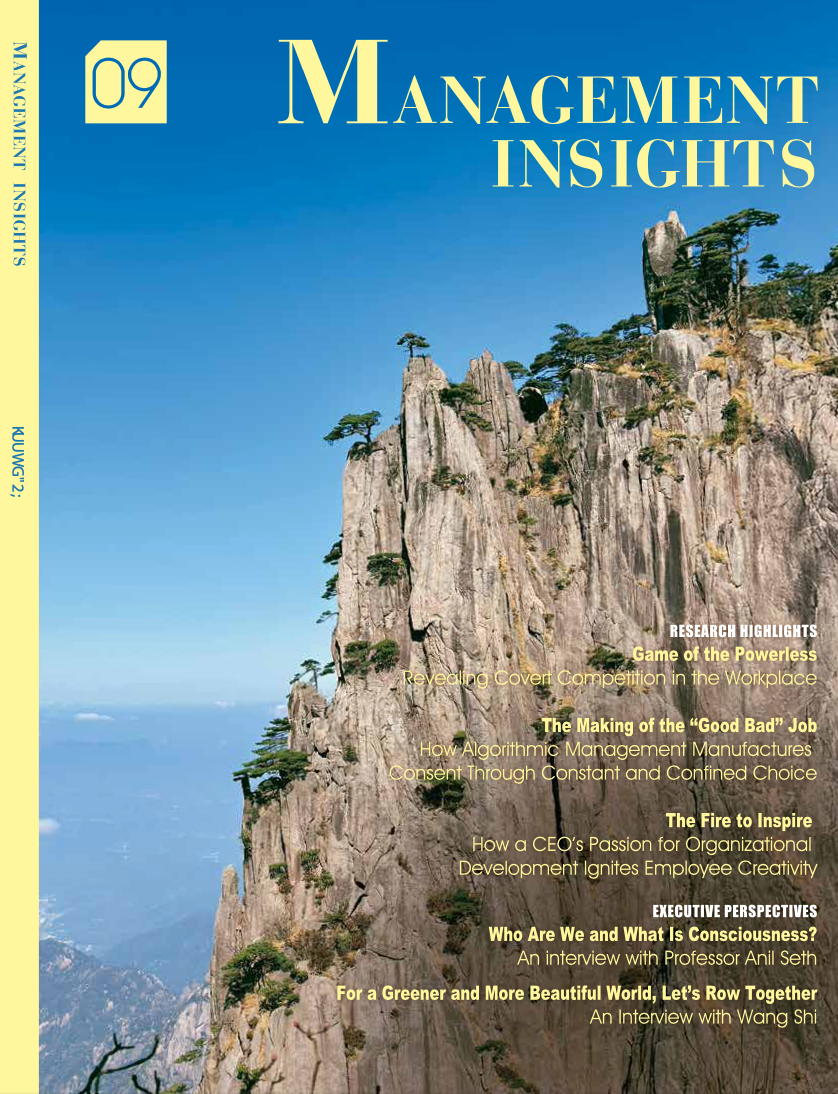Management Insights Annual-English-issue 2025
Maintaining A Sense of Autonomy in An Increasingly Automated World
Xiao-Ping Chen
The year 2024 marks the dawn of a new era of machines taking more active roles in our work and life. AI tools such as ChatGPT, Midjourney, Sora, and Co-pilot enter every aspect of professional jobs to improve efficiency, algorithms interact with gig workers every minute to guide their work processes and schedules, firm digital transformations force all employees to understand their position in the large organization and play their prescribed roles to make the organization operate smoothly, and industrial robots are replacing more and more humans in the name of liberating them from repetitive mechanical boring tasks. With all these great technological advancements, meanwhile, are we feeling more relaxed or more frustrated? Are we becoming smarter or dumber? Are we experiencing more happiness or panic? Are we sensing more autonomy or being more controlled? These are the questions that occupy my mind these days.
Although I have not come up with any definitive answers to these questions, I do hope that the articles included in this annual issue of Management Insights can offer some glimpse. For example, in “The making of ‘good bad’ jobs”, Lindsey Cameron find that gig workers tend to break out the constant and confined choice by algorithms with two key tactics — engagement and deviance – that help them take back the agency they deem attractive in such jobs in the first place. In “Game of the powerless”, Zhong and Li discover that low-status employees tend to adopt covert strategies to compete with others to avoid negative repercussions and gain status. Moreover, in “Would ‘nice guys finish last’?”, Liao and colleagues, through meta-analysis of 200 studies, find that pro-social motivations not only boost individual well-being, but also predict better job performance and career advancement than pro-self motivations.
Human connection is a source of happiness, it is also crucial in building personal identity and fuels passion and creativity. In “How do founders’ workspace uses influence their identity?”, Eliana Crosina discovers that “settlers” – those who stay put – tend to develop a strong entrepreneur identity within a community, whereas the “nomads” – those who move around in a public office space– cannot develop such identity. In “The fire to inspire”, Gong and colleagues demonstrate that CEO’s passion for organizational development, when coupled with strong promotion skills in social interactions, would induce middle manager to exhibit transformational behaviors that facilitate front-line employee job creativity.
More hopeful perspectives are offered in the interview I conducted with Anil Seth, a neuroscience professor and author of Being You. He convincingly argues that machines do not have consciousness, intelligence, or hallucinations, only humans and other living bodies do. The human brain can make predictions, but machines cannot because their responses are restricted to the training materials they receive.
Finally, Mr. Wang Shi, the founder of Deep Dive and Vanke Group, embodies human agency. I interviewed him twice, with 10 years in between. The first interview was conducted when he was the CEO of Vanke, during which time he told me how he decided to quit his job in a state-owned enterprise and started his own business, which took enormous amount of courage in the 1980s in China. The present interview was conducted last summer, a few years after he started his second company Deep Dive, with a mission of helping people to have deeper understandings of themselves and the world through rowing. Impressively, during the global pandemic from 2019 to 2022 when travel became extremely difficult, Wang Shi led the Deep Dive team through numerous challenges, rowing in 123 canals and urban rivers worldwide, crossing fourteen countries. Through rowing, they also spread the message of carbon neutrality and water environment protection.
Writing to this point, I certainly feel more optimistic about maintaining autonomy and agency in this increasingly automated world. I hope you feel the same.
Happy 2025!
2024.11.18

